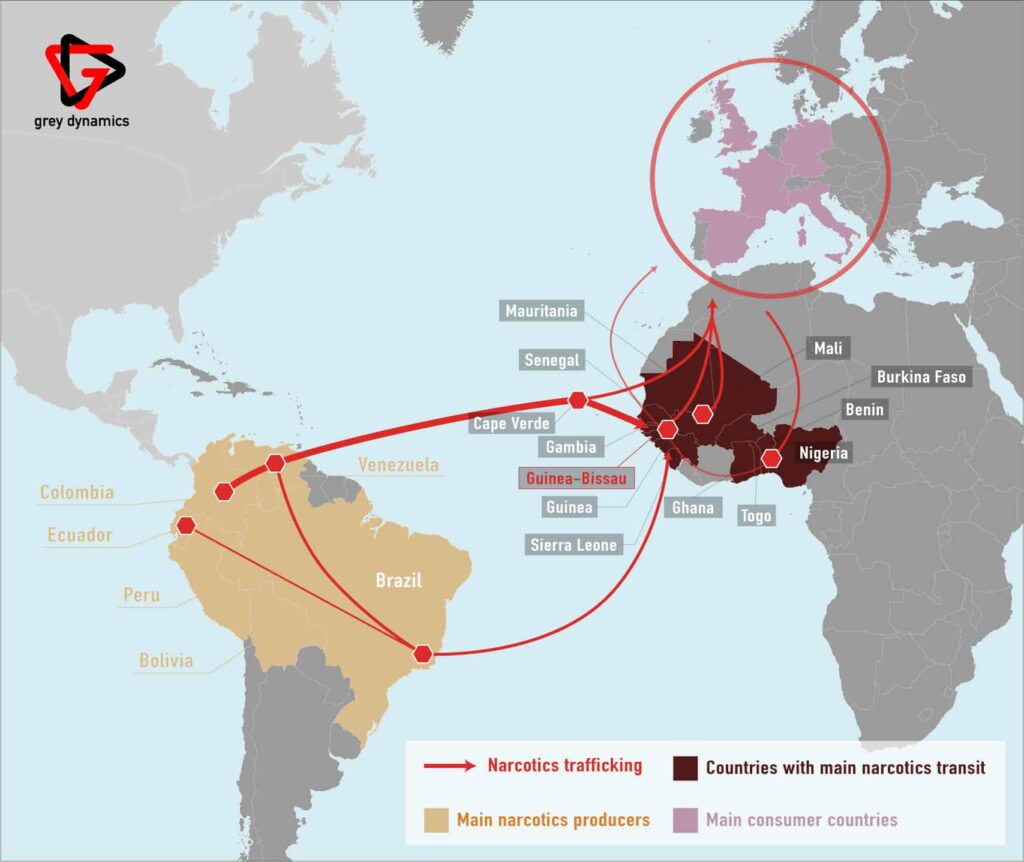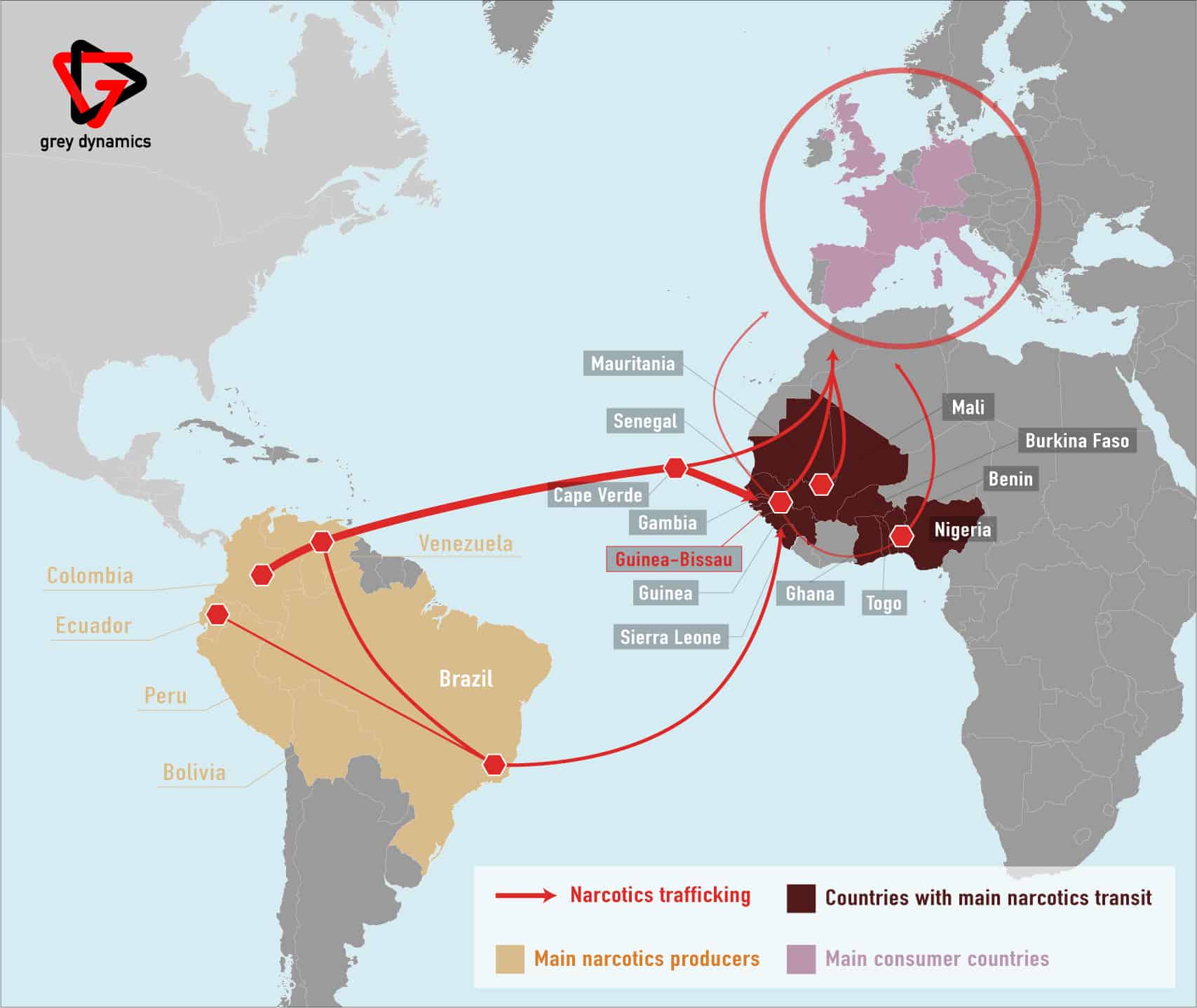Author: Ilas Touazi - Africa Team
Introduction
The interlinkages between international phenomena such as the illicit drug economy, transnational organised crime, conflict, and terrorism have become the absolute reality of globalisation and the complex interdependence that reflects its savage side. The spread of Al-Qaeda, the Islamic State, and their regional affiliates as key predatory actors in global governance through paradoxical guerrilla warfare using theological justifications and political fabrications to promote “narco-jihadism,” exploiting Haram money for a Halal cause, makes Africa the new epicentre of the nexus between organised crime, narcotics, and terrorism's nebulae.
A triptych of terrorism, religion and organized crime: a marriage of carp and rabbit between haram and halal
In Islam, the main source of prohibitions and permissions comes from the Qurʾān. Thus, “Halal” means anything that is permitted or conforms to Islamic law with a set of rules concerning the adherents' principles of life and “Muslim morality.” It includes, among other things, nutritional standards that comply with Sharia law. Conversely, the concept of “haram” refers to matters that are unacceptable or illegal under Islamic law, i.e., all harmful chemical substances (toxins) that are dangerous to human life and health, as well as the consumption of narcotics and drugs are considered prohibited (Haram). While the involvement of al-Qaeda and Daesh in the dirty narcotics business is a heady cocktail under a triangle that combines politics, religion, and jihadist crusades, narcotics and terrorism have no religious hue.
Islamist terrorist groups have justified jihad as halal and part of the acts of “ijtihad” or martyrdom as a necessary religious duty carried out by the “muharribun” against the “kuffar” (infidels), thus constituting a halal and legitimate cause. Although the Qurʾān explicitly forbids the outbreak of war and authorises combat only against real aggressors, jihadist thinking has adapted to political realism, authorising wars of expansion, even using illegitimate means, i.e., Haram. Indeed, with the internationalisation of the jihad, previously focused on the “near enemy,” then towards the “far enemy,” described in the Islamic vision as the “home of war” (dar al-ḥarb), thus making it possible to wage an offensive jihad, using narcotics to spoil Western society with drugs and the ongoing use of mass production and distribution of illicit drugs, intrinsically contrary to Islam, as a pretext to advance religious and ideological objectives and justify the “holy” war against the West.African Jihadist terror-crime nexus spectrum: A cross-trigger-incubator cycle
African Jihadist terror-crime nexus spectrum: A cross-trigger-incubator cycle
“Narco-jihad” is the contradictory and absurd justification of acts of violence in the name of religion, fuelled by the revenues of the illegal drug trade, which consists of spoiling “infidel” Western forces with drugs and consolidating Islamic rule, not by faith but with a well-calculated guerrilla strategy, since the drug economy remains one of the main sources of funding for jihadist-matrix terrorism in Africa. The practice of narco money for jihad dates from the Islamist “mujahideen” groups against the Soviet Union. As for post-modern jihad, the use of cryptocurrencies and bitcoin has overtaken traditional methods of transferring funds as part of “crypto-jihad.” Meanwhile, with globalisation, the end of the Cold War, and the “global war on terror,” the “terrorism-crime continuum” became a growing threat, forming an adaptive alliance to changing circumstances. On others, terrorist and organised crime groups used a dual “modus operandi” nexus, including logistics and material support, and protections under geographical “safe havens” deeply intertwined over “hybrid groups.”
Henceforth, African jihadi narcotics rely on religion, local conflicts, anti-western rhetoric, corruption of government officials, and the general feeling of injustice to gather support. However, the “black hole syndrome,” in which the convergence between terrorist nebulas and transnational organised crime groups is mainly occurring within Sahel’s “ungoverned space,” where a weak or failed state has created conditions ripe for jihadist actors connections, including Niger’s narco-networks to gain economic and political power. In so doing, a complex “glocal jihad” is emerging, linking local, national, regional, transnational, and global levels in a dialectical, blurred, and intertwined process that goes beyond local spatial realities, as applied by Al-Qaeda in the Islamic Maghreb (AQIM) in its strategy of geographical expansion in the Sahel with complex interconnections between smuggling networks and illegal arms and drug trafficking. In this respect, jihadist groups operating in West Africa have maintained their actions and even expanded, opportunistically and pragmatically resorting to various sources of funding, with the smuggling of drugs and narcotics, particularly cocaine and cannabis resin, playing a key role in the entrenchment of “narco-jihadist” activities in the Sahel region. Notably, Al-Mourabitoun and the Gourma Katiba focus on kidnapping for ransom and trafficking in drugs, arms, and transnational criminal activities.
Africa’s narco-jihadism landscape and trends: dual dynamics between hybridization and trans-nationalisation
The African threat landscape has consistently changed, and the narcotics routes are varied, with Guinea-Bissau as a key “narco-state” facilitating the flow of illegal narcotics, with drugs transiting through the Sahara, passing Jihadist zones, North Africa, and then on to Southern Europe. As a result, the east coast of Africa is becoming a hub for the international heroin trade networks and forms an integrated regional criminal economy with its long coastline providing landing sites and safe routes for Afghan heroin destined for markets in Europe and North America. Simultaneously, according to the UNODC World Drug Report 2023, Africa remains a key region for cocaine trafficking, mainly in West Africa, while North Africa is a central axis for the inter-regional smuggling of cannabis resin and cannabis. However, half of the pharmaceutical opioids seized worldwide between 2017 and 2021 were in Africa, largely due to the non-medical use of tramadol. This is why, more recently, tramadol has been a main aspect of “narco-jihadism” under an era of “low-cost terror”, including Captagon, which has become the “drug of Jihad” used initially by Islamic state fighters and militants of narco-terror groups in the Middle East region, also known as the “cocaine of the poor,” “ISIS’s drug,” and then spread through African jihadist operatives as war drugs and money laundering business.

AfricaIndeed, the 2023 Global Terrorism Index report has heightened the relationship between terrorism and ecological threats under a vicious cycle of progressively greater asymmetrical challenges, mainly clustered in African regions. As such, the 2022 Ecological Threat Report (ETR) identified that most African countries have emerged as “hotspots” affected by climate change, terrorism, conflict, and crime, with the highest risk in sub-Saharan Africa (SSA). However, African jihadist groups are moving more towards environmental terrorism, which encompasses not only wildlife crime but also smuggling and all kinds of activities, including the illegal taxation of natural resources, which accounts for 38% of conflict financing, drugs (28%), seizures and looting (26%), and money extorted from kidnappings for ransom (3%).While a study conducted in 2023 by UNODC has demonstrated that illicit financial flows (IFFs), including smuggling of migrants (SOM) and trafficking in persons (TIP), especially women and children, with the involvement of non-state armed groups and terrorist and violent extremist groups (VEGs), have cross-border implications through the west African region with Islamic state local affiliates,.
The African franchises of al-Qaeda and the Islamic State: Narco-jihadism, a necessity that allows prohibitions
Some areas of the African continent, have become a new global hotspot for narco-jihadist activities. Local VEGs, claiming inspiration from ideologies espoused by Al-Qaida or Daesh, reflect a “proto-state” version of governance that operates within a wider political economy characterised by “business models” with “Big Man” patron-client organisations or “warlords,” as Mokhtar Belmokhtar's nicknamed “Mister Marlboro,” using cigarette smuggling to finance AQIM and affiliated groups such as Ansar Al-Sharia. However, Jama'at Nasr al-Islam wal Muslimin has engaged with illicit economies and tactical use of economic warfare through its involvement in post-modern razzias (or rezzous), which replaced the ancient caravan trade in the Sahel-Saharan belt with a criminal economy based on cannabis resin (hashish), then cocaine. Indeed, the narco-jihadism networks spread across ethnicities and tribes, namely with “black jihad,”exploited by Ansaroul Islam, building alliances with criminal gangs such as Lahmar and Tuareg traffickers and TilemsiArabs. In West Africa, the drug trade has fuelled the Islamic State West Africa Province (ISWAP) and the Movement for Unity and Jihad in West Africa (MUJWA) with illicit trade networks, particularly synthetic opioids, and charges “transit taxes” to narcotics trafficking. However, Al-Shabaab militants have financial or operational links with the pirates. These close ties are referred to as the “sea jihad.” In fact, in December 2023, a new alliance was formed with Somali pirates operating off the coast, receiving 30% of all ransom proceeds.
Certainly, Al-Qaeda and Islamic State African affiliates have used the religious tax known in Islam as zakat as a source of legitimacy and religious authority, imposed on herders in the Sahel with the demand for cattle as payment for zakat, on the one hand in exchange for protection and on the other for financing jihadism. Although zakat in Islam is not explicitly given in exchange for services, it has been usurped by JNIM and the Islamic State-Sahel Province (ISSP) in the name of religion, becoming a coercive measure and a source of illegitimacy under the new guise of “cow jihad.”Meanwhile, Boko Haram has normalised gender-based violence as a strategy of terror with the commodification and militarization of women as sex slaves; this is built around some theological justifications that permit submission to men and the exploitation of women, including forms of slavery or human trafficking for sexual purposes. Whereas Islamic law considers human trafficking, including violence against women and children, drug trafficking, and smuggling, to be crimes of ta'zir.
Conclusions
The process of terrorist groups using religion to promote narcotics causes, particularly in the African continent, has become part of the postmodern jihadist landscape. That’s why counter-terrorism must be based first and foremost on an understanding of the patterns and modes of jihadist thought, as well as on a solid grasp of the intellectual matrices and theological foundations that represent an effective, preventive tool for building resilience in the face of violent extremism and mitigating the factors behind this globalized phenomenon. Hence, education and academic work in favour of the new moderate discourse are constants to expose their shortcomings and contradictions in the form of a soft approach that must accompany hard structural and operational counter-terrorism.

No comments.